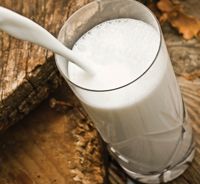Standards Tightened for Organic Milk, but Some Groups Object

The U.S. Department of Agriculture (USDA; Washington, DC) published a proposed rule in the October 24 Federal Register intended to clear up confusion about the grazing requirements for cattle involved in organic milk production. But the new rule already has some groups worried about its effect on small dairy producers.
USDA issued the rule clarifying USDA's National Organic Program (NOP) livestock standards partly in response to previous complaints that large dairy producers were flouting the standards by confining cattle to feedlots and using conventionally raised animals for some parts of their operations.
The new rule defines the term growing season and requires access to pasture during the entire growing season for all animals older than six months. The rule also requires that animals receive 30% of their dry matter intake from pasture and clarifies practices related to temporary confinement.
The comment period for the proposed rule closed on December 23.
"This proposed rule gives producers better tools to manage pasture and demonstrate compliance with the NOP and gives certifying agents better tools to measure that compliance," USDA Agricultural Marketing Service administrator Lloyd Day said on November 22. "Consumers will also know the regulations for animals grazing on pasture meet their expectations."
Industry stakeholders generally praised the rule. The Organic Trade Association (OTA; Greenfield, MA), for instance, described it as being "in the spirit" of practices that most organic farmers have used for some time.
"This rule will continue to reassure shoppers that milk, beef, lamb, and other products are from animals that have access to well-managed pasture according to the strict national organic standards," OTA executive director Christine Bushway said on October 23. "Organic production is about continuous improvement of farms and the environment, and this proposed regulation is the next step in improvements for organic dairy, beef, lamb, and goat production in the United States."
Similarly, Horizon Organic (Boulder, CO) said in a statement that strong regulation and enforcement of the grazing requirement will boost consumer confidence and ensure the responsible growth of the industry.
"Horizon Organic has publicly supported the strengthening and clarification of this rule for the past several years, and we reiterate our support today," Horizon spokesperson Sara Loveday said on November 5. "We are pleased to see the proposed rule contains a requirement for a minimum of 30% dry matter intake from grazing and a requirement for continuous grazing through the growing season."
However, the Cornucopia Institute (Cornucopia, WI) took a different position, arguing that while the grazing standards were useful, the rule also incorporated several other positions that could hinder the rule's implementation.
"We are pleased that USDA has finally addressed the concerns of the organic dairy community," according to Mark Kastel, senior farm policy analyst at the Cornucopia Institute. "But it appears that the department has once again monkey-wrenched this process by incorporating a number of red herrings-major policy proposals that have never been reviewed by the industry or, as Congress mandated, by the National Organic Standards Board (NOSB)."
Specifically, the Cornucopia Institute objected to new policies related to the feeding of cattle, setting aside land as sacrifice pasture, classifying bees and aquatic species as livestock, and the transitioning of conventional cattle into organic operations.
Kastel noted that the NOSB did not review the policies. He added that USDA appears to have ignored five policy proposals recommended by NOSB since 2000.
Senate Committee has released the text of 2024 Farm Bill, with changes to hemp regulations
November 19th 2024The U.S. Senate Committee on Agriculture, Nutrition, & Forestry has introduced the Rural Prosperity and Food Security Act, which will serve as the Senate’s draft for the 2024 Farm Bill.
NPA’s lawsuit against FDA on NMN stayed pending agency’s decision on citizen petition
November 6th 2024The court has granted a joint motion for stay filed by NPA and FDA, pending the agency's decision on the citizen petition asking FDA to reverse its stance on NMN's status as a dietary ingredient.